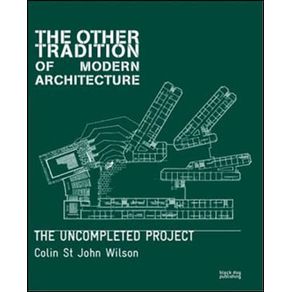This revised edition of an essential work by Colin St. John Wilson, architect of the British Library and one of the most eminent voices in architectural theory and practice of the last 50 years, is here made available to a new readership. As important now as it was when first published, Professor Wilson sets out to examine the underlying themes of Modern European architecture, assessing their impact, influence, and continuing development. Rather than positioning Modernism as an historical moment, now left in the past, St. John Wilson argues for a continuing tradition, an 'uncompleted project', sustained against the rigidifying orthodoxy, the white walls, functionalism and blank boxes of C.I.A.M., by a 'resistance movement' carried by the largely independent work of Alvar Aalto, Hans Scharoun, Frank Lloyd Wright and Sigurd Lewerentz. This 'movement', he argues, worked within context, negotiation and use, and as such, provides a valuable model for an approach to which contemporary architects should aspire. The book, then, is not merely an historical document but a rallying cry - not only to those practising in the field, but to a wider audience who have been alienated by the strictures of orthodox Modernism. Drawing upon philosophy, history, art and architectural theory, the work of these Modern masters is explored both in theory and by means of comparative analyses of specific buildings in a text that takes in an extraordinary range of references with erudition, insight and originality. Aesthetic theory, in the work of Adrian Stokes among others, and approaches to psychoanalysis in the work of Freud and Klein, are cited alongside a broad range of references, in a work that defines Wilson's own architectural criticism to date. This new edition is a precursor to a major volume on Colin St. John Wilson's work, which Black Dog Publishing is releasing in March 2007.



